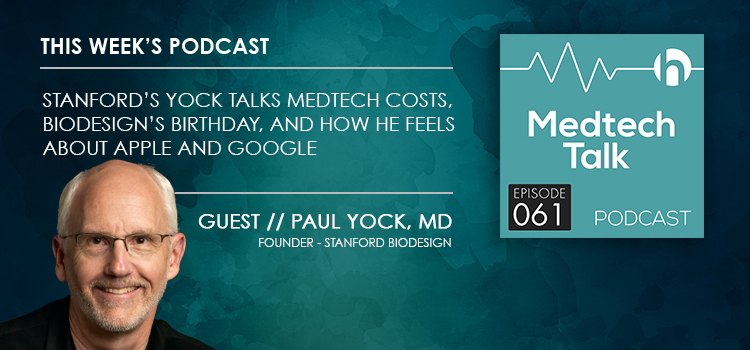May 3, 2017

Sixteen years ago, Paul Yock, MD, an innovative interventional cardiologist, created what’s now known as the Stanford Byers Center for Biodesign to teach something that many saw as something that couldn’t be taught.
In this interview with Medtech Talk, Dr. Yock recalls that some believed, “Innovation is the playground of the unusually gifted and you can’t make a practice or a discipline out of it.”
The center went on to do just that, tilling the soil that helped nurture start-ups like Oculeve, which created a device to treat dry eye that received FDA approval just this week. (Allergan acquired the company two years ago.)
The center’s teachings have become even more critical as the forces dragging on Medtech innovation grow even more complex.
“Unlike consumer product innovation, Medtech doesn’t have a single customer,” Dr. Yock explains. “You have a very complicated matrix of stakeholders, all of whom have interest in new technology,” including patients, providers, and payers.
In this podcast, Dr. Yock shares his insights on Medtech innovation, explains the impact financial pressures have had on new creation, and offers his take on Google and Apple making a run on developing Medtech devices.
Paul Yock, MD
Founder
Standford BioDesign
Paul Yock is the Martha Meier Weiland Professor of Medicine and Mechanical Engineering (by courtesy) and Founding Co-Chair of Stanford’s Department of Bioengineering. He also holds a courtesy appointment on Operations, Information, and Technology in the Stanford School of Business.
Paul is internationally known for his work in inventing, developing, and testing new devices, including the Rapid Exchange™ balloon angioplasty system, which is now the primary system in use worldwide. He also invented a Doppler-guided access system known as the Smart Needle™ and PD-Access™. The main focus of Paul’s research program has been in the field of intravascular ultrasound. He authored the fundamental patents for mechanical intravascular ultrasound imaging and helped conduct the initial clinical trials. In 1986, he founded Cardiovascular Imaging Systems, which was acquired by Boston Scientific in 1994. Paul has also co-founded several other medical technology companies.
In his academic career, Paul has authored over 300 peer-reviewed publications, chapters and editorials, textbooks, and over 45 US patents. Recent awards include the Transcatheter Therapeutics (TCT) Career
Achievement Award, the American College of Cardiology Distinguished Scientist Award, and an honorary doctorate from Amherst College. Paul is a member of the National Academy of Engineering. Current research interests of Paul’s group at Stanford focus on development and testing of catheter-based delivery systems for cardiac cell transplantation and new catheter and molecular imaging techniques for cardiology. He also founded and directs the Program in Biodesign, a unit of Stanford’s Bio-X initiative that focuses on invention and technology transfer related to biomedical engineering.
